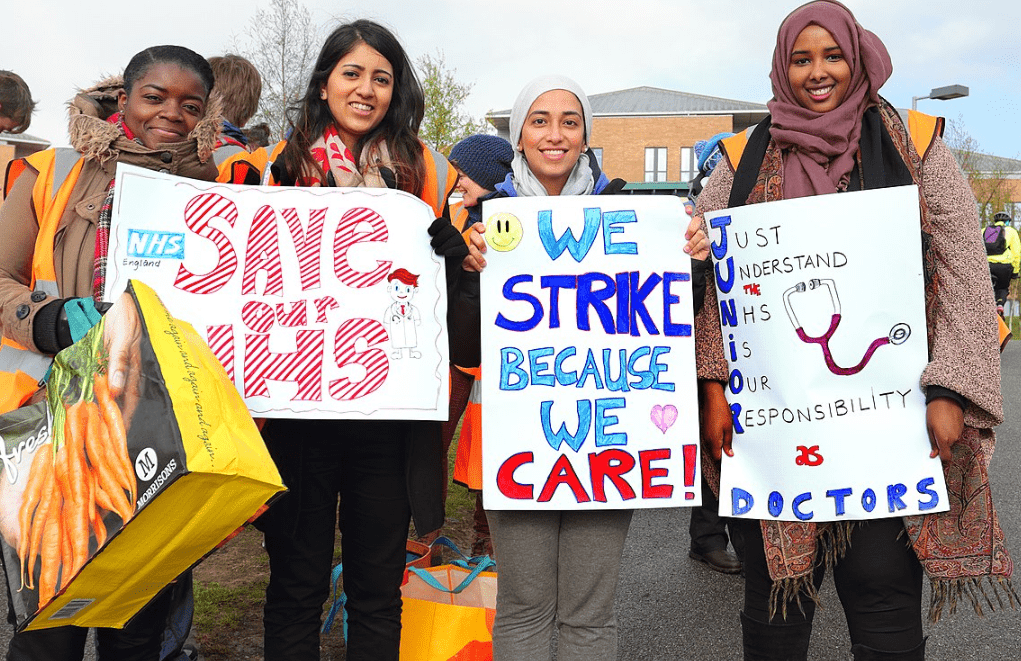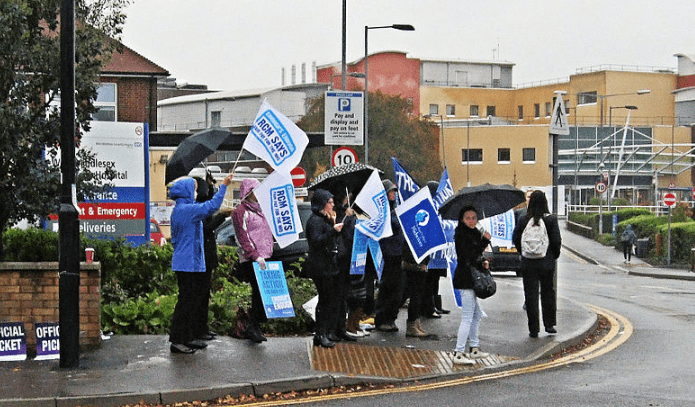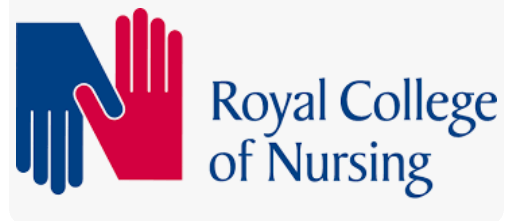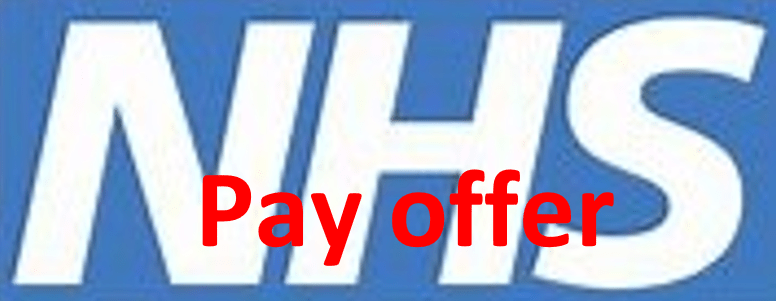The leaders of three of the main NHS unions in the pay dispute are badly letting down their members by recommending acceptance of a deal that goes nowhere near keeping pay in line with inflation. Unfortunately, recommending such a poor offer will not encourage members to fight on, especially when they see their leaders showing such unseemly haste in calling strikes off.
In recent months, the Government has faced the biggest strike wave for decades, across a range of industries and services, but mostly in the public sector where government austerity is felt most harshly. It is much more difficult to go on strike today, both from a financial and a ‘legal’ point of view, than it was in the 1970s and 1980s, thanks to anti-union laws and restrictions on benefits to the families of striking workers. Yet hundreds of thousands of workers have showed their willingness to make sacrifices in fighting to have their wages match the rate of inflation.
Millions are facing the biggest cuts in their living standards for generations. According to the Resolution Foundation, if wage rises had continued to rise after 2008, as they had in the thirty years prior to that, workers would today be £11,000 a year better off. As it is, highly skilled workers are being ground into the dirt both by overwork and by being underpaid.
Faced with this strike wave, the strategy of the government has been to take each dispute on a case by case basis, aiming to offer the least they think they can get away with, according to their assessment of whether or not each group of workers and, their union leaders, will fight on. The pay rise offered to the firefighters, for example, still did not match the rate of inflation, but it came close to it, and for that reason firefighters overwhelmingly accepted it.
The Tories have the measure of the weaker trade union leaders.
That certainly cannot be said to be true of the NHS pay offer. It seems like the government have looked some union leaders in the eye and have accurately guessed at a reluctance to fight on. Some have wanted all along, and at all costs, to avoid ‘confrontation’.
These union leaders seem to have a policy that mirrors exactly the Tories’ strategy – seeking an offer than is just sufficient to undermine the capacity of the most active members to continue their action. Then, going to a ballot, they hope to win, they can hold up their hands and claim, “We tried!”

As it is, many NHS workers are not clear about the detailed terms of the deal on offer. But the basic message is that there is an additional non-consolidated lump sum on the table for the current financial year, plus a rise of 5% for most workers in 2023/24. This is at a time when the ‘official’ rate of inflation still in double figures for this month. There are also some grades abolished and some new ones created.
In return, the government wants an end to all industrial action for the duration of the agreement. As NHS workers have said, an unconsolidated bonus is not even a pay rise in the real meaning of the word.
The only one of the big unions not to recommend the offer is Unite. Onay Kasab, Unite’s lead national officer in the negotiations, said in a Channel 4 interview that the unconsolidated payment, “will do nothing for future recruitment to the NHS”, and he pointed out that workers in hospitals “are relying on food banks”. He also expressed his anger that the offer seems to be funded out of existing NHS budgets.
“We’re appalled”, he said, “…because throughout the whole process, the government have insisted that there will be new money”. Tory Health Secretary, Stephen Barclay, will no doubt be coming back to find ‘efficiencies’ in the NHS. “How can you expect nurses and NHS staff to work even harder?”, Kasab asked.
“Ministers have lost the battle for public opinion on NHS strikes” – Observer
Although Unite are not making any recommendation – it will be left to local reps to discuss with members – the leader of the biggest nurses’ union, Pat Cullen, has not only recommended the deal, but gave a veiled threat to her members about what happens, should they turn the offer down. The RCN general secretary, warned on her union website, , “No union could enter negotiations and flatly say ‘no’ until you get everything you want. These talks will not be reopened if members reject this pay offer.” That is not just a ‘hint’ to RCN members; it reads more like an ultimatum from a leadership unwilling to take the dispute further.
The UNISON website is little better. In a statement, it says that if the deal is accepted, “the offer would boost pay significantly this year and mean a wage increase next year that’s more than the government had budgeted for”. It is barely a gain at all to get “more than the government had budgeted for”. Members of UNISON will no doubt note that the leadership were always reluctant to categorically spell out in interviews that NHS staff wanted to keep wages in line with inflation. That simple message ought to have been made loud and clear from the beginning, but it never was.

It is not as if there wasn’t public backing for NHS workers in their industrial action. There hasn’t been an NHS workers’ picket line anywhere in the country that hasn’t been inundated with well-wishers, from the general public to hospital visitors, to hospital patients.
As the Observer noted last Sunday, “The latest Opinium poll…shows just 17% of people back the Tories on public services against 43% who would prefer Labour…The findings, which reinforce the view that ministers have lost the battle for public opinion over NHS strikes…” The unwillingness of NHS union leaders to continue the fight, therefore, is despite overwhelming public support for their action.
The deficiencies of this offer will loom large in the minds of NHS workers when they go to ballot. Apart from the miserably poor uplift in pay, it does nothing for regional disparities and it potentially creates divisions between nursing grades and others that were not there before. Above all, it will do nothing to help the long-term crisis of recruitment.
Troops do not go into battle, seeing their generals have given up
But it is not only the offer itself that will give NHS workers pause to think. They will also be concerned about the lack of confidence shown by their own union leaders. That, more than anything, could undermine support for the continuation of strike action. Troops are always reluctant to go into battle if they see that their generals have already given up and are looking for a way out.
Although some of the balloting starts next week, it is not clear how the ballots will be structured. When the dispute was first launched, there were ‘disaggregated’ ballots, trust by trust, because the union leaders were not confident of getting an overall vote past the statutory threshold. For that reason, where some trusts did not meet the threshold, workers have not been taking action.
But there are no legal restrictions or thresholds over whether or not to accept or reject a pay offer, so it may be that an overall vote is organised by all of the unions. From the point of view of informing the members, the unions – or at least local lay reps – should be arranging workplace meetings and discussions to hammer out the details of the pay offer before any votes are cast. A workplace, collective response of that kind, is far better than leaving isolated members to the misinformation of the mass media, or, if it comes to that, to the blandishments of union leaders.
It seems that there is some momentum growing against the deal, although at this stage it is not easy to see how successful it will be. A campaign organised by members of the Unite, RCN, GMB and UNISON, has been launched to reject the offer. NHS workers say No has sent out leaflets to thousands of union members, arguing: “Make no mistake – it was strike action that got the unions in the room with the government, and it is strike action that will deliver full pay restoration.”
Snap poll shows only a third would accept the NHS offer
According to a snap poll by the website Nursingnotes, only 33% would vote to accept the deal when it is put to members. “Figures suggest” the website adds, “the deal would still leave experienced nurses around £4,000 worse off in real terms than in 2008”.
Another grassroots campaign group, Nurses United, which was instrumental in transforming the entire leadership of the RCN after the union accepted a disastrous deal in 2018, have dubbed the deal “terrible”, saying that it will only add to twelve years of real terms pay cuts. The lead organiser of Nurses United, told Nursing notes, “After 12 years of patients struggling to get treatment because of a lack of staff and 12 years of nurses skipping meals and crying at work, we’re being offered another terrible deal which cuts NHS pay in real terms.”
“This will do nothing”, he added, “to stop the thousands of staff leaving. This does nothing to reward staff for the work they put in day after day to keep things afloat…We need to restore our pay back to the real terms levels it was in 2010. That’s the only thing that will improve staffing levels which is so necessary to bring our NHS back to safety”. Needless to say, Nurses United, like NHS workers say No, is urging those in the ballot to reject what amounts to a pay cut.

According to our sources, the UNISON Health Service Executive – consisting (unlike the negotiators) of lay members – voted by a narrow 20-15 to accept the deal. It is possible that UNISON members in the NHS will reject it outright, but overall, it is difficult to say in advance what the outcome of the ballots will bring.
What we can say is that whatever the outcome, this poor settlement will have important long-term implications for the internal life of all of the unions involved. As we described in an earlier article, it was the anger and disappointment of RCN members after the 2018 deal that led to the replacement of the entire union leadership, from the general secretary down.
RCN members will be aghast at their leaders accepting a pay award so far from the level for which they were fighting. After having appeared to lead the charge at some stages in the dispute, the RCN has now appeared to lead the retreat, and it is likely to have been their agreement with government that has been the template for the overall offer.
There will be repercussions in all of the unions
They will be angry, after having been supported on picket lines by members of other health unions, that the RCN was ‘privileged’ by the government to be first into negotiations, with the deliberate intent (which is reflected in the proposed pay grades) of driving a wedge between nurses and all other health workers.
We have also seen how the growing anger among low-paid UNISON members led to the election of a majority for the left slate of that union’s NEC. That shift is likely to be further enhanced by these events. Why, UNISON members will ask, was the RCN allowed to ‘set the pace’ on NHS pay and get a privileged seat at the negotiations? Why didn’t our union spokespersons spell out clearly that wages have to keep up with inflation?
GMB members will be embarrassed in ambulance services when their union recommends a deal that may be turned down by their fellow-workers in Unite. It may well lead to haemorrhage of members from one union to another which is more willing to fight.
In all of the unions, members will note that there was not one lay NHS worker involved in any of the negotiations. What has been an abdication of leadership by the majority of the big NHS unions, will leads to anger, disillusionment, and disappointment among members. It will rebound on those leaders in the months and years to come.
The ultimate driver of political change is the economic imperative of the squeeze in living standards, on a scale not seen in generations. If the current trade union leadership are not up to the challenge in facing that, then they will be replaced by leaders who are.



